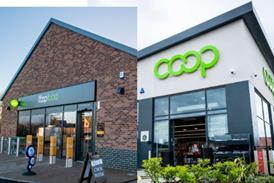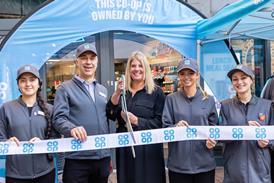Good customer service should be at the heart of convenience store retailing. Kate Miller finds out how to master it
Retailers up to their eyeballs training staff in new legislation could easily be forgiven for
leaving customer service to look after itself. Time is money after all, and there often aren't enough hours in the day to make sure every member of staff is saying please and thank you. However, for independents, customer service is often the point of difference against the multiples, and failing to keep it a high priority can mean losing customers' loyalty.
Adam Vincent, joint manager of Dike & Son in Stalbridge, Dorset, says retailers ignore customer service training at their peril. "No matter how good your stock is, it's the lasting impression of how they were dealt with that matters," he says.
According to Nisa-Today symbol group director John Heagney,
retailers often misinterpret the value of customer service training by
looking only at its short-term impact. "People look at training and see it as a cost," he says. "It may well be, in terms of cash investment and time, but the payback is really worth it."
One retailer who is a firm believer in training is Raj Aggarwell, who runs two Londis stores in the Glenfield and Wigston areas of Leicester, employing 10 staff. He says that in an increasingly competitive marketplace, it's customer service that makes the difference. "Convenience stores thrive on good customer service - it's our niche. It's what we've got that Tesco and other
supermarkets haven't."
Customer service, he says, is at the heart of his businesses, but he knows that it's an area in which there can always be improvement. "Until you've actually been on a course yourself, you don't really see the benefits. You think you're doing everything right, but small changes can make huge differences." Raj says retailers should look beyond the money paid out for courses: "The cost is very small compared with what you gain."
According to Kevin Maxfield, managing director of Retail Plus, a company which specialises in training retailers, competition is prompting independents to employ his company's services. "There's been an increase in the past year or so. Retailers who aren't in a symbol group and don't have that backing are asking what they can do to compete. The first thing they ask for is always customer service."
Maxfield says that undergoing formal training doesn't mean training your entire staff at once: "If you've got 12 members of staff, you pick the best ones for customer service and then they become 'customer service champions'." These staff can then train other staff, or take over when there's a problem. Bonus schemes can incentivise this extra responsibility.
Retail Plus delivers workbook-based training to Nisa-Today. Once initial training is complete, NVQ-level training including Level 2 in customer service can be offered. Heagney says that it's up to the
retailers in the group whether they get involved or not, but they are encouraged to do so. "Good retailers often don't need any encouragement," he says.
At Spar, retailers undergo the mandatory Sparkling Service in-house training programme. They can then choose to go on to certificate- and NVQ-based programmes. Kerry Hunt is company training manager for Tates and looks after the training needs of 209 stores and 3,700 staff. She says that customer service
training takes place initially as part of the induction, then in three 20-minute coaching sessions per year.
Hunt says: "It's a lot more than saying please and thank you. We get them to think about their place in the community and what service they can offer. It's also about recognising different customer needs - for
example, if someone wants
assistance, which could be getting the shopping to the car, or just moving something out of the way so that a customer can get a buggy in." Managers coach staff through each training unit and then staff go away and fill in a worksheet. "It's very discussion-based, not a tick and cross execution."
Store managers are given four weeks to complete a particular unit with each member of staff, and the resulting information is logged. For staff who decide on NVQ and certificate training, a bonus scheme - paid each quarter - is linked to the learning.
Hunt says that customer service training can help staff realise the importance of their job: "I don't think staff naturally think of themselves as part of the community. They see it as 'my little job' but don't see the big picture. The considered application of customer care training helps with that."
According to Heagney, a certificate-based training programme can make a big difference to staff, who may never have received any sort of accreditation before: "People who work in a store may have left school with no qualifications. The fact is that if you invest in them, and put them on training courses, they really shine. It's a huge boost to their confidence and self-esteem."
But for those who find the idea of paying for outside training just a bill too far, there are examples of
retailers who offer great customer service without formal staff training. For instance, while Dike & Son is a Nisa-Today member, the Dorset store prefers to take a different approach. This was seen in full effect when the store shut its former 12,000sq ft shop to open a 17,000sq ft store virtually next door in November last year. As a consequence of the move, more than 20 new members of staff have been taken on and trained.
Adam Vincent says that the easiest and most successful way to train new staff in customer service is to enrol other members of staff as mentors (or buddies) for new recruits: "Once you've been through the formalities, it's important to buddy people up with older members of staff. This way, new members of staff get
introduced to customers, and they learn that, for instance, when a customer comes in and asks for wine, just because you work on chilled it doesn't mean you can't walk them over to the wine section."
As well as being shown that they should be proactive with customers, new recruits are encouraged to help customers take shopping to their cars. "If you went into Tesco you wouldn't expect anyone to help you to the car, but it's accepted as the norm at Dikes. It's going that little bit further," says Adam.
However, Adam believes that however much you train staff, the ethos of good customer service has to come from the top. The store's former owner, William Dike, who died last year, knew all his customers by name, and this culture continues today. "You can almost smell that ethos when you walk into Dikes," says Adam.
Retail trainer Kevin Maxfield agrees that retailers can achieve amazing things without outside intervention: "But if they want to make a difference they have to assess themselves first. What does the store offer? What do the staff offer? What do I need to do to make the store offer great customer service? You can't really get to grips with customer service if you've not looked at your own store standards."
Spar corporate development director Phil Marchant advises retailers looking to train staff in customer service to speak to other retailers and find out what they do. And it doesn't just have to be within retail either. "Where have you been that has great customer service? How do they do it? Apply those standards to your own business."
Another trick, says Adam Vincent, is to have a mirror in the stock room so that staff can see what the customers see every time they walk on the shop floor.
The most important thing to the success of any training, according to Maxfield, is to get your staff on board: "Get the staff involved and ask them what they think could be done. And ask if anybody has any previous customer service experience - they often have. If you're starting from scratch you need a series of team briefings with the store manager for preparation. It's vital to get people on board, otherwise you're trying to sell something that they don't believe in." And lastly, he adds, "Lead from the front by setting a great example of best practice."
Marchant says that it's not the money spent on training that's the most important thing - it's the time. "The main thing is to spend time with staff on a one-to-one basis. The feedback we get from staff is that they really appreciate that the owners have taken time out of their day to talk about customer service."
But Maxfield says retailers have to be realistic: "You can't just do a course or a half-hour briefing and expect everything will be cured.
Customer service has to be part of the business attitude."
Adam Vincent also stresses the importance of trusting staff and letting them spend time with customers: "We encourage staff to talk to the customers rather than push them through the till. A staff member talking to a customer on the shop floor is part of the job."
Maxfield believes this applies to managers, too: "If you're going to get to grips with customer service you should be the manager on the shop floor. You need to become part of the community and engage with your customers."
To check that the training is working, Raj Aggarwell employs Musgraves' mystery shopping programme, Gapbuster. He receives a report once a month, part of which is about customer service. "It shows on a monthly basis how you're doing. We can't be there all the time," he says. Spar also has a mystery shopper
service which is angled towards customer service - Sparkling Service Snapshots - which visits stores four times a year.
"If Snapshots highlights a need then the manager of that store can go back to the relevant module and go over it again with the staff," says Marchant.
Spar claims that its training methods are really working, in terms of bottom line performance.
Following its three-month trial of customer service training across different types of UK stores,
incorporating mystery shopping, uplifts of up to 12% in sales were observed. Some 43% of regular customers noticed an improvement in service, and mystery shopper scores were over 90%.
A powerful bonus from training, says Heagney, is staff retention: "A well trained staff is a happy staff, and we see a strong correlation between well trained staff and staff retention.There's a knock-on effect. Trained staff have a much less stressful life because people know exactly what they're meant to be doing. You invest in staff and they pay you back in service."
Retailers up to their eyeballs training staff in new legislation could easily be forgiven for
leaving customer service to look after itself. Time is money after all, and there often aren't enough hours in the day to make sure every member of staff is saying please and thank you. However, for independents, customer service is often the point of difference against the multiples, and failing to keep it a high priority can mean losing customers' loyalty.
Adam Vincent, joint manager of Dike & Son in Stalbridge, Dorset, says retailers ignore customer service training at their peril. "No matter how good your stock is, it's the lasting impression of how they were dealt with that matters," he says.
According to Nisa-Today symbol group director John Heagney,
retailers often misinterpret the value of customer service training by
looking only at its short-term impact. "People look at training and see it as a cost," he says. "It may well be, in terms of cash investment and time, but the payback is really worth it."
One retailer who is a firm believer in training is Raj Aggarwell, who runs two Londis stores in the Glenfield and Wigston areas of Leicester, employing 10 staff. He says that in an increasingly competitive marketplace, it's customer service that makes the difference. "Convenience stores thrive on good customer service - it's our niche. It's what we've got that Tesco and other
supermarkets haven't."
Customer service, he says, is at the heart of his businesses, but he knows that it's an area in which there can always be improvement. "Until you've actually been on a course yourself, you don't really see the benefits. You think you're doing everything right, but small changes can make huge differences." Raj says retailers should look beyond the money paid out for courses: "The cost is very small compared with what you gain."
According to Kevin Maxfield, managing director of Retail Plus, a company which specialises in training retailers, competition is prompting independents to employ his company's services. "There's been an increase in the past year or so. Retailers who aren't in a symbol group and don't have that backing are asking what they can do to compete. The first thing they ask for is always customer service."
Maxfield says that undergoing formal training doesn't mean training your entire staff at once: "If you've got 12 members of staff, you pick the best ones for customer service and then they become 'customer service champions'." These staff can then train other staff, or take over when there's a problem. Bonus schemes can incentivise this extra responsibility.
Retail Plus delivers workbook-based training to Nisa-Today. Once initial training is complete, NVQ-level training including Level 2 in customer service can be offered. Heagney says that it's up to the
retailers in the group whether they get involved or not, but they are encouraged to do so. "Good retailers often don't need any encouragement," he says.
At Spar, retailers undergo the mandatory Sparkling Service in-house training programme. They can then choose to go on to certificate- and NVQ-based programmes. Kerry Hunt is company training manager for Tates and looks after the training needs of 209 stores and 3,700 staff. She says that customer service
training takes place initially as part of the induction, then in three 20-minute coaching sessions per year.
Hunt says: "It's a lot more than saying please and thank you. We get them to think about their place in the community and what service they can offer. It's also about recognising different customer needs - for
example, if someone wants
assistance, which could be getting the shopping to the car, or just moving something out of the way so that a customer can get a buggy in." Managers coach staff through each training unit and then staff go away and fill in a worksheet. "It's very discussion-based, not a tick and cross execution."
Store managers are given four weeks to complete a particular unit with each member of staff, and the resulting information is logged. For staff who decide on NVQ and certificate training, a bonus scheme - paid each quarter - is linked to the learning.
Hunt says that customer service training can help staff realise the importance of their job: "I don't think staff naturally think of themselves as part of the community. They see it as 'my little job' but don't see the big picture. The considered application of customer care training helps with that."
According to Heagney, a certificate-based training programme can make a big difference to staff, who may never have received any sort of accreditation before: "People who work in a store may have left school with no qualifications. The fact is that if you invest in them, and put them on training courses, they really shine. It's a huge boost to their confidence and self-esteem."
Going it alone
But for those who find the idea of paying for outside training just a bill too far, there are examples of
retailers who offer great customer service without formal staff training. For instance, while Dike & Son is a Nisa-Today member, the Dorset store prefers to take a different approach. This was seen in full effect when the store shut its former 12,000sq ft shop to open a 17,000sq ft store virtually next door in November last year. As a consequence of the move, more than 20 new members of staff have been taken on and trained.
Adam Vincent says that the easiest and most successful way to train new staff in customer service is to enrol other members of staff as mentors (or buddies) for new recruits: "Once you've been through the formalities, it's important to buddy people up with older members of staff. This way, new members of staff get
introduced to customers, and they learn that, for instance, when a customer comes in and asks for wine, just because you work on chilled it doesn't mean you can't walk them over to the wine section."
As well as being shown that they should be proactive with customers, new recruits are encouraged to help customers take shopping to their cars. "If you went into Tesco you wouldn't expect anyone to help you to the car, but it's accepted as the norm at Dikes. It's going that little bit further," says Adam.
However, Adam believes that however much you train staff, the ethos of good customer service has to come from the top. The store's former owner, William Dike, who died last year, knew all his customers by name, and this culture continues today. "You can almost smell that ethos when you walk into Dikes," says Adam.
Retail trainer Kevin Maxfield agrees that retailers can achieve amazing things without outside intervention: "But if they want to make a difference they have to assess themselves first. What does the store offer? What do the staff offer? What do I need to do to make the store offer great customer service? You can't really get to grips with customer service if you've not looked at your own store standards."
Spar corporate development director Phil Marchant advises retailers looking to train staff in customer service to speak to other retailers and find out what they do. And it doesn't just have to be within retail either. "Where have you been that has great customer service? How do they do it? Apply those standards to your own business."
Another trick, says Adam Vincent, is to have a mirror in the stock room so that staff can see what the customers see every time they walk on the shop floor.
The most important thing to the success of any training, according to Maxfield, is to get your staff on board: "Get the staff involved and ask them what they think could be done. And ask if anybody has any previous customer service experience - they often have. If you're starting from scratch you need a series of team briefings with the store manager for preparation. It's vital to get people on board, otherwise you're trying to sell something that they don't believe in." And lastly, he adds, "Lead from the front by setting a great example of best practice."
Marchant says that it's not the money spent on training that's the most important thing - it's the time. "The main thing is to spend time with staff on a one-to-one basis. The feedback we get from staff is that they really appreciate that the owners have taken time out of their day to talk about customer service."
But Maxfield says retailers have to be realistic: "You can't just do a course or a half-hour briefing and expect everything will be cured.
Customer service has to be part of the business attitude."
Adam Vincent also stresses the importance of trusting staff and letting them spend time with customers: "We encourage staff to talk to the customers rather than push them through the till. A staff member talking to a customer on the shop floor is part of the job."
Maxfield believes this applies to managers, too: "If you're going to get to grips with customer service you should be the manager on the shop floor. You need to become part of the community and engage with your customers."
To check that the training is working, Raj Aggarwell employs Musgraves' mystery shopping programme, Gapbuster. He receives a report once a month, part of which is about customer service. "It shows on a monthly basis how you're doing. We can't be there all the time," he says. Spar also has a mystery shopper
service which is angled towards customer service - Sparkling Service Snapshots - which visits stores four times a year.
"If Snapshots highlights a need then the manager of that store can go back to the relevant module and go over it again with the staff," says Marchant.
Spar claims that its training methods are really working, in terms of bottom line performance.
Following its three-month trial of customer service training across different types of UK stores,
incorporating mystery shopping, uplifts of up to 12% in sales were observed. Some 43% of regular customers noticed an improvement in service, and mystery shopper scores were over 90%.
A powerful bonus from training, says Heagney, is staff retention: "A well trained staff is a happy staff, and we see a strong correlation between well trained staff and staff retention.There's a knock-on effect. Trained staff have a much less stressful life because people know exactly what they're meant to be doing. You invest in staff and they pay you back in service."


























No comments yet